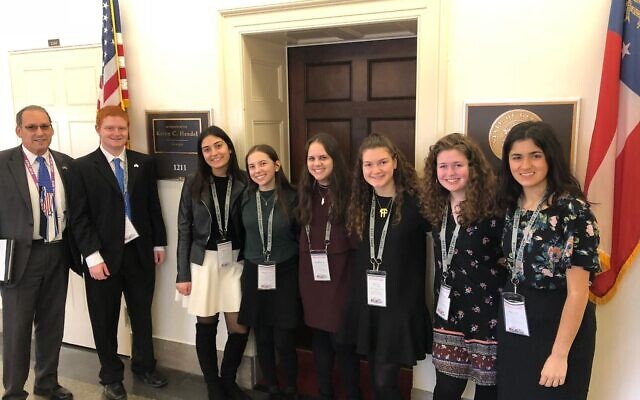Researching the Election
Atlanta Jewish Academy’s Israel Advocacy Club developed voters’ guide to where candidates in 30 zip codes stand on issues related to Israel.
Anna Levy is the Online Content Coordinator for the Atlanta Jewish Times.
“For us, voting doesn’t mean just checking a box. It means being educated about the candidates …Your vote is your voice, and it is the only way to truly enact change!”
That statement is part of the mission of the Atlanta Jewish Academy’s Israel Advocacy Club, a student-run club dedicated to education, advocacy, and strengthening of the Israel-U.S. relations.
To further their mission, the club put together a voter’s resource guide flipbook aimed at educating voters about local elections and how candidates voted and stand on Israel issues. It defines important Israel-related terms, details the candidate’s positions, and lists sources for all gathered information.
To create the flipbook, the students looked at the zip codes in which AJA members live. The Sandy Springs school has about 450 students. This translated to about 30 zip codes. Then they determined the races happening in each of those areas and got to work researching, calling campaign offices, and looking at each candidate’s past voting history.

Sivan Livnat, a co-president of the club, is on a national teen council through AIPAC that looks at issues related to younger voters.
Livnat said of the flipbook, “We wanted to make sure that our information was accurate, and at the end of the flipbook, we added all the links so that our sources were visible to everyone. While we were finding our information, we made sure to stay unbiased and be as thorough as possible in our search for the answers.”
Matthew Minsk, another club co-president, also stresses the importance of fact-checking and accuracy when creating the flipbook. “Every claim about a candidate is cited either from a specific bill, press release, correspondence with a campaign, or undisputed quote from the media.
“Discourse has to be based on agreed-upon objective and documented facts before it can progress, and that’s what we tried to provide.”
Erica Gal, AJA’s admissions director, is in her first year as faculty sponsor of the Israel Advocacy Club. “I am so excited to be faculty advisor. We have an amazing group of kids; they are dedicated, politically minded, and understand the importance of the future relationship of Israel with the U.S.”
You can view the flipbook here.




comments